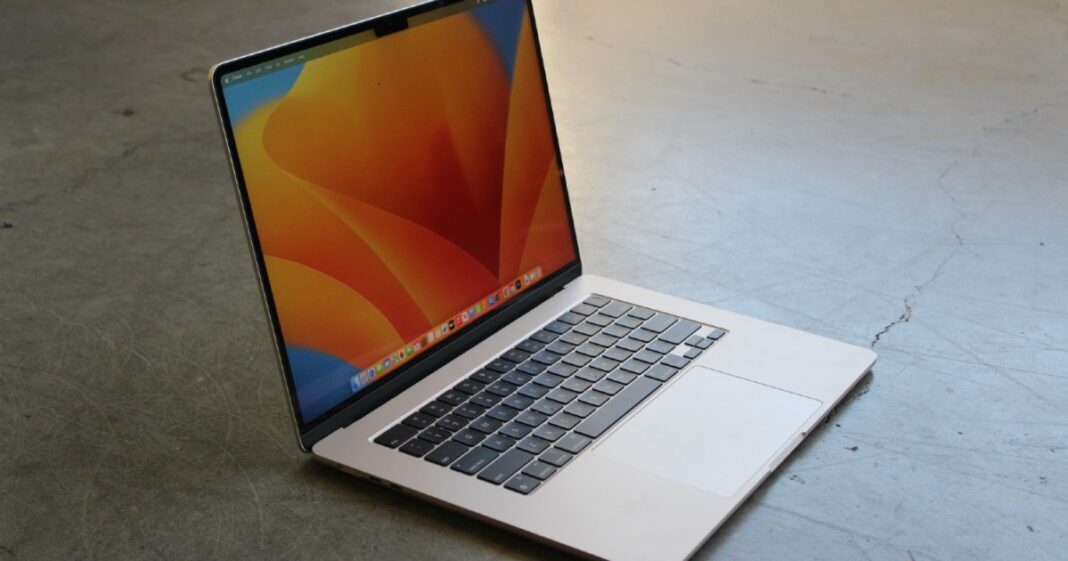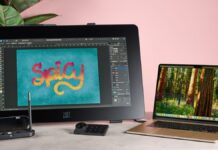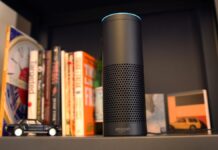The Asus Zenbook 14X OLED is one of my favorite new Windows laptops that I reviewed this year. It’s a great value, offering a fast CPU alongside an excellent OLED display.
But can it compete with the MacBook Air 15-inch? The incredible build quality and incomparable battery life make it a tough battle for the Zenbook to win, even at its more budget-friendly price.
Specs and configurations
| Asus Zenbook 14X OLED | Apple MacBook Air 15 | |
| Dimensions | 12.67 inches x 8.88 inches x 0.67 inches | 13.40 inches x 9.35 inches by 0.45 inches |
| Weight | 3.44 pounds | 3.3 pounds |
| Processor | Intel Core i5-13500H Intel Core i7-13700H Intel Core i9-13900H |
Apple M2 (8 cores) |
| Graphics | Intel Iris Xe Nvidia GeForce RTX 3050 |
10-core GPU |
| RAM | 8GB 16GB 32GB |
8GB 16GB 24GB |
| Display | 14.5-inch 16:10 2.8K (2,880 x 1,800) OLED, 120Hz | 15.3-inch 16:10 Liquid Retina IPS (2,880 x 1,864), 60Hz |
| Storage | 512GB SSD 1TB SSD |
256GB SSD 512GB SSD 1TB SSD 2TB SSD |
| Touch | Yes | No |
| Ports | 2 x USB-C with Thunderbolt 4 1 x USB-A 3.2 Gen 2 1 x HDMI 2.1 1 x 3.5mm audio jack |
2 x USB-C with Thunderbolt 4 1 x 3.5mm audio jack |
| Wireless | Wi-Fi 6E and Bluetooth 5.2 | Wi-Fi 6E and Bluetooth 5.3 |
| Webcam | 1080p with infrared camera for Windows 11 Hello facial recognition | 1080p |
| Operating system | Windows 11 | MacOS Monterey |
| Battery | 70 watt-hours | 66.5 watt-hour |
| Price | $800+ | $1,299+ |
Don’t Miss:
The Zenbook 14X OLED is available in several configurations, including an $800 entry-level model with a Core i5-13500H, 8GB of RAM, a 512GB SSD, and a 14.5-inch 2.8K OLED display (the only option available). Our review unit was the $1,000 configuration with a Core i7-1370oH and 16GB of RAM. You’ll spend $1,500 for a Core i9-13900H, 32GB of RAM, a 1TB SSD, and an Nvidia GeForce RTX 3050 instead of integrated Intel Iris Xe graphics.
The MacBook Air 15 is considerably more expensive, starting at $1,299 for an 8-core CPU/10-core GPU M2 processor, 8GB of RAM, a 256GB SSD, and a 15.3-inch Liquid Retina IPS display. At the high end, the MacBook costs $2,499 with 24GB of RAM and a 2TB SSD.
You’ll spend about $500 more for the MacBook Pro 15 with half the storage, making the Zenbook 14X OLED a more affordable laptop by a considerable margin.
Design
The Zenbook 14X OLED has a more mundane design compared to the MacBook Air 15. It’s constructed of aluminum, but doesn’t have quite the same rigid and quality feel as the MacBook Air 15 that’s made from CNC-machined aluminum. Both laptops are minimalist in their design, but the MacBook Air 15, available in four different colors, gives off an elegance that the Zenbook, available in just one color, doesn’t enjoy.
The MacBook Air 15 is a bit wider and deeper than the Zenbook 14X OLED. Both laptops weigh about the same, but the MacBook is a stunning 0.45 inches thick versus the Zenbook’s 0.67 inches. The MacBook Air 15 is the thinnest 15-inch laptop available today, and that gives it a sleeker and more portable feel.
You’ll also love the MacBook’s Magic Keyboard, which it shares with other modern MacBooks and is the best keyboard available. It has perfectly sized keycaps and excellent key spacing, with precise and snappy switches that aren’t deep, but are still incredibly comfortable. The ZenBook 14X OLED has a good keyboard with a comfortable layout and switches, but it’s not in the same league. The MacBook’s Force Touch haptic touchpad is also larger and more pleasant to use than the Zenbook’s mechanical version.
Connectivity favors the Zenbook 14X OLED, with a mix of modern and legacy ports. Both laptops have up-to-date wireless connectivity. Both also have 1080p webcams, and the Zenbook has an infrared camera for Windows 11 Hello facial recognition, while the MacBook has a Touch ID fingerprint reader embedded in the power button.
Performance

We reviewed the Zenbook 14X OLED with a 45-watt Intel Core i7-13700H CPU, which has 14 cores (six Performance and eight Efficient) and 20 threads. The MacBook Air 15 has one CPU option, an 8-core CPU/10-core GPU Apple M2.
In our CPU-intensive benchmarks, the Zenbook was considerably faster. Neither are made for demanding creative tasks or gaming, and for most productivity users, both will fit the bill. But the Zenbook 14X OLED will have a higher performance envelope.
| Geekbench (single/multi) |
Handbrake (seconds) |
Cinebench R23 (single/multi) |
|
| Asus Zenbook 14X OLED (Core i7-13700H) |
Bal: 1,848 / 11,157 Perf: 1,852 / 11,160 |
Bal: 84 Perf: 82 |
Bal: 1,819 / 11,066 Perf: 1,826 / 12,795 |
| MacBook Air 15 M2 (M2 8/10) |
Bal: 2,606 / 10,024 Perf: N/A |
Bal: 144 Perf: N/A |
Bal: 1,596 / 8,020 Perf: N/A |
Display and audio

The Zenbook 14X OLED, as its name implies, has an excellent OLED display with incredibly deep contrast and inky blacks, wide and accurate colors, and sufficient brightness. The MacBook Air 15 has a very good Liquid Retina IPS panel that can’t quite keep up with the Zenbook’s. The Zenbook’s display is also slightly sharper given the nearly equal resolutions and a smaller screen size, while running at a faster 120Hz than the MacBook’s 60Hz.
Overall, the Zenbook 14X OLED’s display is superior and very welcome at the lesser price.
| Asus Zenbook 14X OLED (OLED) |
MacBook Air 15 (IPS) |
|
| Brightness (nits) |
355 | 475 |
| AdobeRGB gamut | 100% | 100% |
| sRGB gamut | 98% | 90% |
| Accuracy (DeltaE, lower is better) |
1.04 | 1.23 |
While the Zenbook might win the display battle, the MacBook wins in providing much better audio quality. It enjoys six speakers, including force-canceling woofers, compared to the Zenbook’s two speakers, and they provide deeper and richer audio with more bass than you’ll find in most speakers.
Portability

We’ve already established that the MacBook Air 15 is incredibly thin, but both laptops are comfortably portable. Neither will be a burden to lug around.
However, when it comes to battery life, the MacBook Air 15 is a clear winner. It will last around 18 hours in typical use, compared to eight or less with the Zenbook 14X OLED. You’ll be working well into a second day with the MacBook and plugging in the Zenbook considerably earlier.
| Asus Zenbook 14X OLED (Core i7-13700H) |
Apple MacBook Air 15 (M2) |
|
| Web browsing | 8 hours, 2 minutes | 18 hours 48 minutes |
The Zenbook 14X OLED is a great laptop, but the MacBook Air 15 is better
If you’re on a tight budget, you’ll love the Zenbook 14X OLED. It’s fast, has an excellent OLED display, and decent battery life. It received a high rating in our review for a reason.
But the MacBook Air 15 with its M2 chip is more than fast enough, has a great display of its own, and offers up incredible battery life. It’s also the more elegant and solid design, and while you’ll pay more for it, it’s well worth the price. The MacBook Air offers the better overall experience, but the extra cost make it will be tough to swallow for some.
Editors’ Recommendations
Source link









